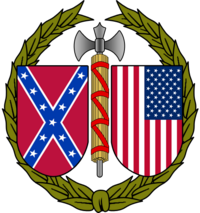Difference between revisions of "Confederate States of America"
(→Legacy: Following up on first two paragraphs of this section.) |
m (→Legacy) |
||
| Line 31: | Line 31: | ||
The president of the Confederate States of America was [[Jefferson Davis]]. | The president of the Confederate States of America was [[Jefferson Davis]]. | ||
| − | == Legacy == | + | == Legacy - Political/Ideological == |
[[American politics]] has been defined in part by the conflict between the [[Alexander Hamilton|Hamiltonian]] and [[Thomas Jefferson|Jeffersonian]] schools of the role of government, particularly the [[Federal government]]. The Confederacy can be seen as the [[last stand]] of the Jeffersonians, who favored a system in which state policy and sovereignty would trump that of the Federal government. To this way of thinking, subsequent American politics have actually been a competition between more and less radical Hamiltonians. The Federal government grew larger and the states less relevant, with no credible plan by the nominal opponents of big government, the [[Republican Party]], to turn back the clock, at least until the emergence of [[Barry Goldwater]] late in the [[Fifth Party System]], whose ideas were finally put into practice with the election of [[Ronald Reagan]] after the realignment of national politics by the [[1968 Presidential election]]. | [[American politics]] has been defined in part by the conflict between the [[Alexander Hamilton|Hamiltonian]] and [[Thomas Jefferson|Jeffersonian]] schools of the role of government, particularly the [[Federal government]]. The Confederacy can be seen as the [[last stand]] of the Jeffersonians, who favored a system in which state policy and sovereignty would trump that of the Federal government. To this way of thinking, subsequent American politics have actually been a competition between more and less radical Hamiltonians. The Federal government grew larger and the states less relevant, with no credible plan by the nominal opponents of big government, the [[Republican Party]], to turn back the clock, at least until the emergence of [[Barry Goldwater]] late in the [[Fifth Party System]], whose ideas were finally put into practice with the election of [[Ronald Reagan]] after the realignment of national politics by the [[1968 Presidential election]]. | ||
Revision as of 17:53, May 22, 2007

| |
| The Civil War
1861 - 1865 | |
|---|---|
| Confederate States of America | |
| Created | February 4, 1861 |
| Ended | April 9, 1865 |
| President | Jefferson Davis |
| Secretary of War | Leroy Pope Walker, Judah P. Benjamin, George W. Randolph, James Seddon, John C. Breckinridge |
| Secretary of the Navy | Stephan Mallory |
| Secretary of State | Robert Toombs, Robert M.T. Hunter, Judah P. Benjamin |
The Confederate States of America were an alliance of 11 southern American states who fought against the Union states in the American Civil War (1861 to 1865). General Robert E. Lee led the Confederate forces into battle against the armies of the Northern states, led by Abraham Lincoln. The confederate states seceded from the North after threats of ending slavery, which they viewed as a matter of states' rights that should not be enforced at the federal level.
The president of the Confederate States of America was Jefferson Davis.
Legacy - Political/Ideological
American politics has been defined in part by the conflict between the Hamiltonian and Jeffersonian schools of the role of government, particularly the Federal government. The Confederacy can be seen as the last stand of the Jeffersonians, who favored a system in which state policy and sovereignty would trump that of the Federal government. To this way of thinking, subsequent American politics have actually been a competition between more and less radical Hamiltonians. The Federal government grew larger and the states less relevant, with no credible plan by the nominal opponents of big government, the Republican Party, to turn back the clock, at least until the emergence of Barry Goldwater late in the Fifth Party System, whose ideas were finally put into practice with the election of Ronald Reagan after the realignment of national politics by the 1968 Presidential election.
While the Confederacy lost the Civil War, it can be seen to have won the peace. Radical Republicans were forced in the 1877 Compromise to concede the failure of Reconstruction and withdraw the U. S. Army from the South, or at least from its mission of guaranteeing the rights of African-Americans. In a process known as Redemption, the Republican Party was crushed out of existence across the South and black people stripped of their voting and other rights by a system which came to be known as Jim Crow. Northern Republicans, never really passionate about black equality, encouraged a narrative of the Civil War which sought to make it about anything other than slavery. They were able to use the phrase "rum, Romanism and rebellion" and other means of waving the bloody shirt to generally dominate national politics through both the Third Party System and the Fourth Party System.
The association of the Democratic Party with the South was entirely accurate as that region was totally dominated by Democrats by 1900. However, only with the election of Woodrow Wilson in 1912 was a Southerner able to return to the White House. Whenever Democrats held a majority of either house of Congress, Southerners would immediately become the chairmen of all committees, giving that region a disproportionate influence on national politics. Ironically, because of their Jeffersonian roots, Southern Democrats were a party of small government and lower taxes (radically cutting back spending on public education among other things during Redemption), and were hostile to organized labor. Before the phenomenon of capital flight was commonly understood, these characteristics of the South had already begun to attract Northern and even foreign manufacturers and the South began to replace the Rust Belt as the center of American industry.